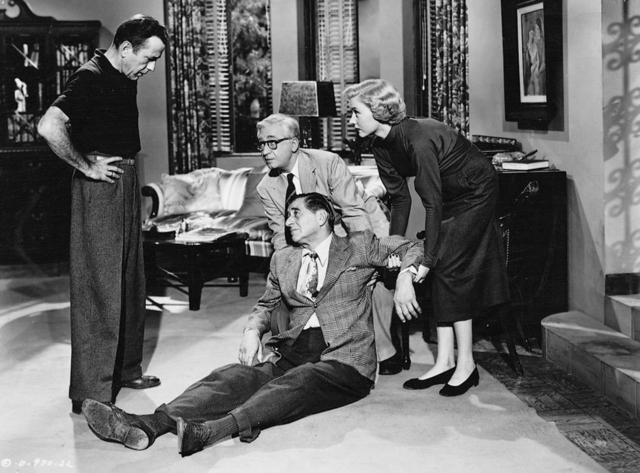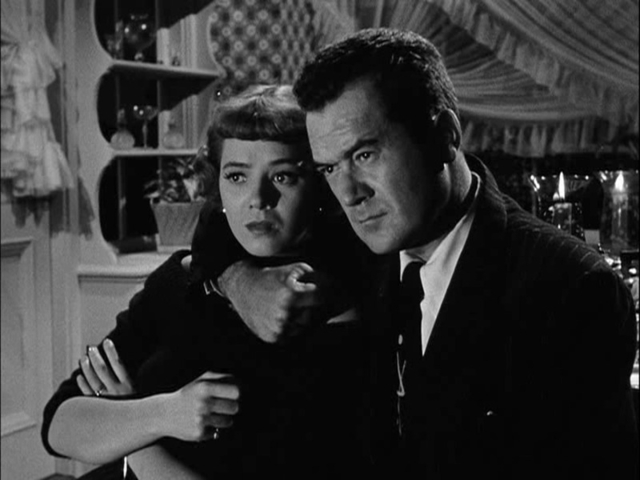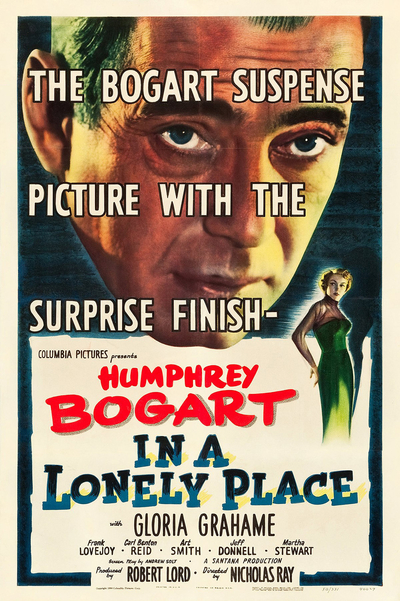It's hard to tell if Humphrey Bogart is still the paragon of masculinity he was back when I discovered old movies back in the last half of the '70s, twenty years after his death. He'd been revived as a ghostly Cyrano by Woody Allen in his 1972 comedy Play It Again, Sam, and near the end of the decade Casablanca was released back into first run movie theatres – where I saw it for the first time. In 1983, NBC even aired a TV remake with Starsky & Hutch's David Soul playing Rick.
I have the feeling, however, that he's become more than just a faded icon – that Bogart's been quietly removed to the same place where Errol Flynn, Clark Gable and John Wayne have been consigned, to molder away with reputations and roles that are now considered problematic. You certainly don't hear about Bogie the way you did when I was a young man, a fatherless boy in search of male role models in a largely female household.
While I can thank that revival of Casablanca for putting Bogart on a big screen in front of me, the role that really resonated was Dixon Steele in Nicholas Ray's 1950 noir drama In a Lonely Place. I knew, even as a teenage boy, that I was flattering myself to imagine that I'd be the stoic hero Rick becomes at the end of Casablanca, but I viewed Dix with a shock of recognition that quickly turned into a warning when I went back to see In a Lonely Place several times at a tiny rep cinema in Toronto, not long after I started college.
At first it's hard not to take to Bogart's Dix – a screenwriter whose faded success has left him with lingering celebrity and a contempt for the movie business that only a string of betrayals and the exhaustion of his inspiration could produce. His wary eyes are the first things we see in the opening credits of the film, staring into the rear view mirror of a car as it makes its way through Los Angeles traffic at night, while George Antheil's score alternates between romantic themes and harsh dissonance.
I knew I liked Steele with his first lines of dialogue, as he pulls up to a traffic light and a woman in the passenger seat of the car next to him calls out his name, introducing herself as an actress who'd worked on one of his films. A burly man in the driver's seat next to her gets angry at him for talking to his wife.
"You shouldn't have done it, honey," Dix tells the woman, "no matter how much money that pig's got."
Unique among Hollywood leading men, Bogart had built his persona, since becoming a star at the turn of the '40s, around a peculiar kind of loner who masks his vulnerability with a quick wit and a palpable streak of cynicism. You could still glimpse the vulnerability in Casablanca's Rick and Steve in To Have and Have Not, but the armour was thicker, his attitude palpably misanthropic, with Sam Spade in The Maltese Falcon and Marlowe in The Big Sleep. The persona was a good fit because it was apparently close enough to the real Bogart, but with Dixon Steele the actor pushed it as far as it could go and perhaps even further, beyond the limits of audience sympathy.
Dix is on his way to Paul's – his regular watering hole, a hangout for industry types on their way up and down. We meet his circle of friends, which includes his long-suffering agent Mel (Art Smith) and Charlie Waterman, a has-been actor, now a sad alcoholic, who Robert Warwick plays as a comic but melancholy John Barrymore. We learn that Dix hasn't had a hit since before the war, that he probably won't again if he keeps turning down jobs he considers junk, and that he rarely answers his phone.

"Don't you like to talk anymore?" he's asked by Frances, an ex-girlfriend who says she'd been calling him the night before.
"Not to people who have my number," he tells her.
Dix also has a violent temper, which erupts when the belligerent son-in-law of a big deal producer makes a pest of himself at the bar; at this stage in his career he's better known as a brawler than a writer.
His agent offers him a job adapting a trashy novel into a script; running out of options, he doesn't turn it down right away, but asks Mildred, a coat check girl who's been reading the book, to come home with him that night and tell him the story. The girl is flattered, and overcomes the potential impropriety enough to break a date.
Ray's camera assumes Steele's viewpoint in the scene back at his garden court apartment, as Mildred breathlessly describes, right to the camera, what sounds like an overcooked melodrama to a conspicuously amused Dix, his sarcastic responses skimming right over her head. The girl is silly and the book is lousy so Dix sends her home with cab fare and a tip and wakes up the next morning to find a detective banging on his door; Mildred is dead, and Dix is the prime suspect.
Brub (Frank Lovejoy), the detective, is an old army buddy whose boss is intent on pinning the murder on Dix until Laurel Gray, his neighbour across the apartment courtyard, provides an alibi. It's at this point that Ray's film gives up any pretense about being a murder mystery; poor Mildred was just a way for Dix and Laurel to meet, and the film does nothing to hide it.

Gloria Grahame plays Laurel, a role that might be the pinnacle of her long but very uneven and ultimately tragic career. Columbia Pictures wanted Ginger Rogers for Laurel, and Bogart – whose company Santana produced the film – wanted his wife, Lauren Bacall. But Nicholas Ray insisted on casting Grahame, his wife, even though by the time the cameras started rolling the couple had separated.
Their marriage had been a short but turbulent one, and Ray's own angry reputation and feelings about the movie business found their way into Dixon Steele as much, if not more, than Bogart's. It's hard to deny that Ray's relationship with Grahame didn't inform the way Dix and Laurel's onscreen relationship moves from heated to blissful to tragic by the time the credits roll.
By the time she made In a Lonely Place, Grahame was known as the sexy girl, starting with her brief but memorable turn as Viola, the town flirt of Bedford Falls in Frank Capra's It's a Wonderful Life. She would make a specialty playing femme fatales, fallen women and tragic molls in films like Crossfire (1947), A Woman's Secret (1949), Sudden Fear (1952), The Big Heat (1953), Human Desire and Naked Alibi (both 1954). Her sultry looks and husky voice made typecasting inevitable, and she rarely managed to find a place where she didn't embody weaponized wantonness onscreen. In a Lonely Place was a rare respite.
Dix notices Laurel the moment she walks onscreen, and at the police station she's startlingly frank about noticing him, telling the detectives that "I like his face." Even for a man like Steele, who holds people at arm's length in emotional self defense, Laurel's interest is like Christmas and birthdays scheduled weekly.
"You know, when you first walked into the police station I said to myself, 'There she is, the one that's different,'" Dix tells her in their apartment courtyard. "She's not coy, or cute, or corny. She's a good guy and I'm glad she's on my side. She speaks her mind and she knows what she wants."
For her part, Laurel doesn't want to be rushed, or at least to have enough time for both of them to decide if this is a good idea. They do, and the scenes that follow – Dix throwing himself into making a silk purse out of the pig's ear of a book, Laurel ignoring her stalled career as an actress to provide support to a man who sorely needs it – have the feel of a fantasy, and probably a uniquely male one. It all lasts until a scene where Dix and Laurel are enjoying Hadda Brooks singing "I Hadn't Anyone Till You" in a swanky bar; it's almost their theme song, but it all starts to fall apart before Brooks finishes the song.

In Gloria Grahame: Bad Girl of Film Noir, Robert J. Lentz writes that "it is clear that they are exactly right for each other, and director Ray refuses to poison this moment in any way. Perhaps this is the way he always imagined life with Gloria, with her gentle devotion and subservience to him no matter the situation. Life, of course, turned out much differently."
When she took the role of Laurel, Grahame was asked to sign an agreement with the producers that she'd obey the director while on set, six days a week – a contract that the always professional Grahame apparently had no problem fulfilling. They were careful to keep their separation a secret, and Ray even had an apartment built into the set where he stayed overnight, with the excuse that he had too much work to bother going home.
A friend in New Orleans once programmed In a Lonely Place into a film series he ran in a local bar. A young woman, a millennial who was dating a friend of his, was triggered by the film, conspicuously walking out during the scene where Laurel and Dix are at their happiest, shocked that she'd stay with a man so prone to violence. She complained to my friend that it was "like, a total bro movie," and that Laurel wouldn't be with Dix because "he's a million years old." You wonder if she'd have changed her mind about the film if she'd bothered to stay to the end, but perhaps that's not the point any more.
There's still a lot of film to sit through once things start turning sour for Dix and Laurel, as if Ray really wants to make us feel it. The police still consider him a murder suspect, and even if she wasn't frightened by his outbursts of violence, he becomes needy and jealous, precisely how a man as damaged as Dix would behave in the real world, very unlike the noble sacrifice made by Casablanca's Rick.

Invited to dinner by Brub and his wife (Jean Marie "Jeff" Donnell, an underrated actress best known as Tony Curtis' secretary in Sweet Smell of Success), Dix directs a reenactment of Mildred's murder with an avid, even perverse enthusiasm that frightens the detective's wife. "He's a sick man," she later tells her husband, who excuses his old friend and war buddy by saying "he's exciting because he's not normal."
Even after Laurel provides an alibi for Dix, Brub's boss still wants to pin the murder on him, mostly because of how he reacted when he was told about Mildred's death – with apparent indifference and wry jokes. "I grant you the jokes could be better but I don't know why the rest should bother you," Dix chides him. "Unless you plan to arrest me for lack of emotion."
Writing about the film, Lentz says that "Dix doesn't visibly grieve for Mildred because he considers her just another victim of Hollywood's relentless appetite for human souls. Having been partially devoured himself – essentially blacklisted within the industry for his argumentative nature, despite what seems to be enormous talent – Dix simply cannot feel much empathy for a girl who, with questionable taste in books and a tendency for histrionics, is unable to defend herself properly."

It's a cold analysis of Dix, but it isn't inaccurate, and Ray himself certainly doesn't do much to make us mourn poor Mildred. It's hard to deny that Dix lacks empathy, or at least an ability to express it, though Ray makes a point to show him buying flowers for Mildred's funeral, and sending $300 anonymously to a college student who he nearly beats to death after a traffic accident that Dix caused.
"I'm scared of him," Laurel tells Mel when he discovers that she's planning on leaving after Dix proposes. "I don't trust him."
At the bottom of all of the violence and jealousy is a deep self-loathing that was abundantly clear to me when I saw it, at barely twenty, mostly because I recognized it in myself.
"You're out of your mind," Dix tells Laurel early in their romance. "How could anyone like a face like this?"
I was a deeply unhappy young man, full of anger, and while my experience with women was scant at the time, I had an inkling that I was no lothario, and probably inadequate boyfriend material. (I would be nearly forty by the time I found a woman crazy enough to marry me.) So of course I found Dixon Steele to be sympathetic, even while I understood how he had much more to do with destroying his relationship with Laurel than the Los Angeles Police Department.
Watching the film today, it's obvious that most of the work making the film's ending so tragic is down to Grahame, who's so much more than any lonely boy or man's fantasy of the perfect woman. With no obligation to play the femme fatale, Grahame inhabits Laurel with an appealing worldliness, her mind obviously the equal of Dix's, which is more than you can say about anyone else in the film. It might be one of the few roles Grahame did where her beauty isn't actually a flaw.

Any man with taste and half a brain would be lucky to be with her, which is why she can't be blamed for wanting to escape Dix. At the high point of their romance, Mel jokes that he wishes she'd met Dix ten years earlier so he wouldn't have an ulcer. Ultimately she's probably years too late to really fix what's wrong with Dix, and the film ends with that horrible knowledge descending on him like a judgment.
If the young woman at my friend's screening had read a bit more, she might have complained about toxic masculinity, and she wouldn't have been wrong – In a Lonely Place is very much a film about toxic masculinity, but there's no way you can say that Bogart's Dix is rewarded for being its avatar. I brought a bunch of friends to a screening of In a Lonely Place back when I was still reeling from my discovery of the film, and after the credits rolled I told one of them how much I identified with Dix.
"You know, that's probably not a good thing," he said, and I was suddenly unable to ignore my suspicion that this was true.
Which is why I can't complain when people use a term like "toxic masculinity," though I'm baffled by anyone fleeing from seeing it onscreen. Perhaps that young woman was triggered by the ambiguous responses to Dix; his friends are certainly able to make excuses for him, and even women find it attractive, at least at first. (You would have to be willfully naïve to deny that women aren't attracted to confidence, even when it's misplaced, and that bullies don't possess abundant sexual currency.)
Perhaps this aversion to engage with toxic masculinity in art is a way of also drawing attention away from toxic femininity, which is just as real and often far more dramatically rewarding. In either case it makes for a lot of very poor drama and even worse fantasy, and shelters us from the terrible truth that we are all, men, women and whomever, potentially horrible.
Mark Steyn Club members can let Rick know what they think by logging in and sharing in the comments below, as access to the comments section is one of many benefits that comes along with membership in the Mark Steyn Club.






















